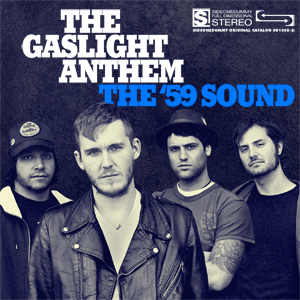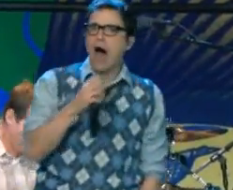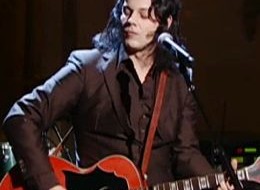

The Gaslight Anthem | “The ’59 Sound” | 2008
From its Born to Run opening riff to its down-and-out, working man lyrics (including repeated lines), the title track to The Gaslight Anthem’s second outing is the best pure rock song of the Aughts. [Maybe I’m slightly biased. It is, as of the time of this writing, the second-most played song on my last.fm account.]
To give you an idea of just how Springsteen-esque this song is (never mind the fact that the band’s from Jersey), simply notice that singer/guitarist Brian Fallon begins a sentence with see: as in, “See, I was playing a show down the road…” It don’t get much more working-class than that. Or how about that repeated line motif: “Cause the chains I’ve been hearing now for most of my life/ And the chains I’ve been hearing for most of my life” from the first verse and “And I know cause we were kids and we used to hang/ And I know cause we were kids and we used to hang” from the second.
Even the song’s subject matter is so totally Bruce. The song wonders what kind of music the narrator’s friend heard as he was dying. But the music being inquired about is only a superficial meaning. When Fallon opens the song with, “And I wonder which song they’re going to play when we go/ I hope it’s something quiet, mannered, peaceful and slow” he’s not simply asking for a soft ditty that calms the spirit. OK, he is. But that’s not the real objective of the song. What Fallon’s actually asking is if his friend’s soul – or anyone’s, really – is truly at peace. In Fallon’s eyes, heaven (or wherever people arrive when they “go” – sidebar: notice how he uses “go” instead of “die”, another Springsteen-ism) is filled with songs from the past, the best stuff: hence, “The ’59 Sound.” And, of course, if you’re gonna sing about how music, however literal or metaphorical it may be, was better back then, you may as well play it throwback style. It all makes perfect sense.
Having two guitarists in the band – Fallon and Alex Rosamilia – allows some fantastic interplay during “Sound.” One chimes the melody during the verses while the other dances along with Alex Levine’s up-and-down bassline. It’s subtle yet stunning. We can’t forget Benny Horowitz who does his best Max Weinberg impression, either. Yet, through all that the real star of the song is Fallon. Not only is he channeling Springsteen more so than any other element here, but he’s also absurdly honest. He knows that some of the lyrics are clichés (“did ya hear the old gospel choir” and “into the everlasting arms”) but he doesn’t care; Fallon believes in what he’s saying. As a result, there’s a certain dignity, a certain transcendence of reality, here that modern music lacks.
Maybe that’s the goal, though. Maybe, just maybe, TGA wants nothing more than to serve as a reminder that certain songs (usually old ones, or new ones that recall old ones) are designed to take you to a place beyond. Beyond what is left for you to decide.


